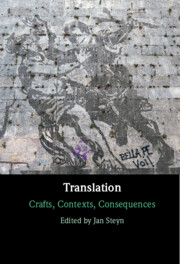Book contents
- Translation
- Translation
- Copyright page
- Dedication
- Contents
- Figures
- Contributors
- Acknowledgements
- Introduction
- Chapter 1 Solitude of the Translator
- Chapter 2 Translation, Creativity, Awareness
- Chapter 3 Anatomy of a Day in the Life of a Translator
- Chapter 4 Sturm, Drang and Slang
- Chapter 5 On X
- Chapter 6 Translating the Greeks
- Chapter 7 Beyond Faithfulness
- Chapter 8 Translation in and of Psychoanalysis
- Chapter 9 Translation across Brains and across Time
- Chapter 10 Covalent Effect
- Chapter 11 Notes on the Translator’s Space/The Editor’s Place
- Chapter 12 The State of Things
- Chapter 13 Translating into a Minor Language
- Chapter 14 An Other Language
- Chapter 15 Five Entries on Translation and Loss
- Chapter 16 ‘A Kind of Radical Positivity’
- Bibliography
- Index
Chapter 11 - Notes on the Translator’s Space/The Editor’s Place
Published online by Cambridge University Press: 23 September 2022
- Translation
- Translation
- Copyright page
- Dedication
- Contents
- Figures
- Contributors
- Acknowledgements
- Introduction
- Chapter 1 Solitude of the Translator
- Chapter 2 Translation, Creativity, Awareness
- Chapter 3 Anatomy of a Day in the Life of a Translator
- Chapter 4 Sturm, Drang and Slang
- Chapter 5 On X
- Chapter 6 Translating the Greeks
- Chapter 7 Beyond Faithfulness
- Chapter 8 Translation in and of Psychoanalysis
- Chapter 9 Translation across Brains and across Time
- Chapter 10 Covalent Effect
- Chapter 11 Notes on the Translator’s Space/The Editor’s Place
- Chapter 12 The State of Things
- Chapter 13 Translating into a Minor Language
- Chapter 14 An Other Language
- Chapter 15 Five Entries on Translation and Loss
- Chapter 16 ‘A Kind of Radical Positivity’
- Bibliography
- Index
Summary
Starting with the observation that the word translation has its etymological roots, as does metaphor, in notions of space, this chapter attempts to revivify the relevance of the notion of space in translation, by relating it to the space that typically is occupied by textual editors. It takes the example principally of Samuel Beckett: looking at examples from his own translation practice as well as his attitudes towards that practice; looking at the work of scholarly editing that went into the four-volume edition of his letters; and questioning the role of the editor who has traditionally been seen as ideally invisible and authoritative. The various stages that go into the making of such an edition – transcription, translation, selection, annotation – are revealed to be reluctant to conform to the notional ideal of the editor’s transparency.
Keywords
- Type
- Chapter
- Information
- TranslationCrafts, Contexts, Consequences, pp. 179 - 193Publisher: Cambridge University PressPrint publication year: 2022

